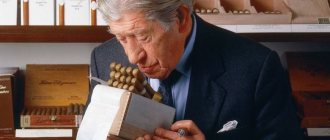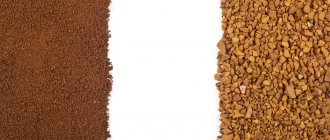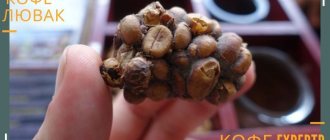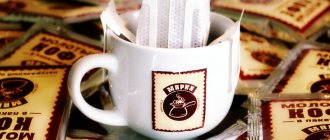What's special about Julius Meinl coffee? The fact that it is Austrian? But coffee beans do not grow in Western Europe. They are brought from equatorial countries - New Guinea, India, Vietnam, Ethiopia, Brazil and others. What is the difference between “Julius Meinl” and, say, “Petrovskaya Sloboda”? We will talk about this in our article. At the same time, we’ll tell you an interesting story about the penetration of coffee culture into Austrian soil. If you are a fan of this drink, you will also learn about the rich assortment of the Julius Meinl house, which has been around for about one hundred and fifty years. We obtained information about the taste of Julius Meinl coffee from user reviews.
What good did the Turks do near Vienna?
Now many tourists associate the capital of Austria with the aroma of coffee and delicious pastries. And few people know that the black drink came to the city thanks to the Turkish conquests. In July one thousand six hundred and eighty-three, a large Ottoman army took Vienna into a tight ring. The Turks even then mastered the art of “living beautifully” and took bags of coffee with them even on military campaigns. And then Polish troops and Ukrainian Cossacks swooped in and liberated the city. The Turks fled so quickly that they forgot several bags. At first the Poles thought it was fodder for the horses. When the horses refused to eat the grains, it was decided to simply throw them away. They would have done so if it were not for the Ukrainian Cossack Yuri Kulchitsky, originally from Lvov. In his youth, he was in Turkish captivity, so he knew very well what to do with the contents of the bags. He roasted the beans, ground them, prepared aromatic coffee and began offering it to the Viennese - for the first month (as a promotion) for free. But the Austrians didn’t really like the new drink. Then the quick-witted Lviv resident began adding cream to it. This is how the famous Viennese coffee was born.
History of the Julius Meinl house
What does Julius Meinl’s company have to do with the above? When the capital of the Austro-Hungarian Empire became known as a city where unsurpassed coffee is brewed, producing countries began to supply green, unroasted beans there. In 1862, entrepreneur Julius Meinl opened a small coffee shop in Vienna. He, as a true gourmet and connoisseur of the drink, noticed that coffee from different countries of origin differs in taste. He began to create skillful blends - not only Arabica and Robusta, but also “international” ones. Another innovation that the entrepreneur introduced was roasting beans. Previously, coffee was sold green. Housewives had to fry it, then grind it. And mills at that time were manual. Therefore, the ceremony of brewing a cup of coffee was preceded by a long process of preparing the beans. And Julius Meinl coffee was enough to simply add water and brew. Naturally, the store was a huge success. Soon, representative offices of the Julius Meinl house opened throughout Austria-Hungary.
Since 1862...
It all started in 1862 with a small enterprise of the Julius Meinl family. Then a small and cozy store of coffee, tea, spices, cocoa and rice opened in Vienna. The highlight and novelty was the roasting of beans, which had previously been sold green and had to be processed at home.
Today Julius Meinl is the leader of the Austrian coffee market and the largest European company, managed by the 5th generation of the Meinl family.
The company's assets include 18 factories in Italy and the Alpine republic, and coffee sales are carried out in 70 countries. At the same time, there are more than 1,000 stores in Europe, including on a franchise basis. The company also creates other products under its own brand: handmade sweets, various types of tea, jams, wines, including sparkling wines, etc.
Symbol
After the First World War, the whole of Europe drank Julius Meinl’s drink. Austrian coffee Julius Meinl was easily recognizable not only because of its rich assortment and varied roasting and grinding. All packs were decorated with a single symbol, which became the logo of the trading house. This is a Moor boy in a fez cap. The symbol makes us remember another legend of the penetration of coffee into Austria. It is beautiful, but, alas, far from the historical truth. They say that the Austrians happened to capture a Turkish Moor boy. He had a knapsack with unknown grains tied to his belt. And the quick-witted little captive bargained for his freedom in exchange for information - how to brew coffee. This beautiful story was adopted by Julius Meinl. After all, the fashion for a black drink, the so-called Turkish coffee, gradually grew. The entrepreneur began to open not only stores of colonial goods, but also cafes and pastry shops. And everywhere in the windows there was a profile of a young Moor in a Turkish fez cap.
Interview
Julius Meinl V is a representative of the oldest Austrian-Jewish business family. His paternal ancestor founded the Julius Meinl company in 1862, which specialized in the import, processing and trade of coffee, and subsequently became one of the largest retail chains in Austria-Hungary and throughout Eastern Europe. After the Nazis came to power in Austria, the family business was confiscated, part of the family died in the Holocaust, the other part was able to escape in Great Britain. After World War II, the Meinls returned to Austria, secured the return of some of their assets and continued to build the family business. Now Julius Meinl is a large international financial holding with assets in Central and Eastern Europe, Russia and other countries of the post-Soviet space. In an exclusive interview with Jewish.ru, which also became his first interview with a Russian-language media outlet, Austrian banker and industrialist Julius Meinl V explained how the Second World War and the Holocaust of European Jewry affected his family, how his grandfather helped identify Nazi criminals and their collaborators, and why The British and other Allies chose to ignore the horrors of the Holocaust.
For Austrian Jews, the real problems began with the Anschluss - the annexation of Austria into Nazi Germany. Your family had a large business and serious positions in Austrian society. How quickly did the family start having problems under Nazi rule? – Immediately. My maternal grandfather was the third-generation owner of the largest and most sophisticated store in the Austro-Hungarian Empire, the Gerngross department store in Vienna. It's kind of like Harrods in London. And the first attack of the Nazis was on our Viennese store - they threw a grenade with tear gas through the window. Grandfather thought that everything would pass. “Although it has become difficult, we have experienced difficult times more than once. There’s no point in hanging your nose – we are proud and strong,” he thought. How wrong he was! Of the seven brothers and sisters in my mother’s family, four died in the Holocaust: in Maly Trostenets near Minsk, in Poland, in Treblinka, one of the sisters, realizing the hopelessness of the situation, simply committed suicide during the deportation. Grandfather and grandmother were able to leave for Uruguay. And of course, everything was taken away from them.
Did the paternal side of the family suffer as much? Your grandfather Julius Meinl III was an Austrian... – On your father’s side, it’s a slightly different story. When the Anschluss happened, my grandparents were in Paris, but their children remained in Vienna, so I had to return. They were detained at the border for a day - they were stripped and searched, but they were allowed through. It quickly became clear to them that Austria was not the place to stay: many restrictions appeared. My grandmother was represented by a famous lawyer. So, a month and a half after returning, she received a letter that said: “Even though we are friends of your family, we can no longer represent you, because we are prohibited from representing Jews.” And so it was in everything: for example, doctors were not allowed to treat them. And they quickly decided to leave. First - to Yugoslavia, and from there - to Great Britain.
What happened to your family business after the Anschluss and emigration? – The Gerngross department store, owned by my mother’s family, was, as the Nazis called it, “Aryanized.” In our case, it was transferred to a German, who took over control and operated the facility. Julius Meinl, a food retail company owned by his father's family, was the largest in its field in continental Europe before the war: 1,000 stores and 65 factories in all the countries formed from the ruins of Austria-Hungary. After the Anschluss, the company was transferred to the National Socialist Youth Movement Trust. A board of directors was formed from members of the NSDAP. We were lucky, one might say, because if the company had become German property, it would have been nationalized by the Austrian government after the war. Small businesses were directly “Aryanized,” while large ones were usually transferred to the control of banks and sold. It is very interesting and at the same time scary to read the newspapers of that time with announcements of expropriation. The language in which they are written is identical to that used in official papers in Austria today. Only instead of the signature “Heil Hitler” there is the signature of some modern minister. Some laws have changed since then, but the legal system remains. It turns out that only the interpretation of the laws is important: then they were interpreted in accordance with the program of the Nazi Party - that’s all. This shows how fragile the world is and is not immune from such things - if the “wrong” people and political forces come to power.
Why did the Meinls decide to return to Austria after the end of the war, rather than staying in Great Britain, where by that time they had already received citizenship? – Don’t forget that the families of my grandfather and grandmother owned very serious companies. And the father, Julius Meinl IV, felt a duty to continue the work that his great-grandfather had founded. When the horrors of the Holocaust became known to the Allied governments, they chose to largely ignore them. What I mean is that they did not bomb the train stations and other infrastructure through which hundreds of thousands of Jews were transported to the death camps. Perhaps there were not enough resources, and there was no final clarity about what exactly was happening there. On the other hand, at the end of the war there was an episode with one famous photographer - she entered the Bergen Belsen concentration camp with British troops and photographed what she saw. This woman was friends with my parents, who were still living in England at that time. And she, returning from the continent, put these photographs on their dining table in London. My grandparents couldn't believe what they saw. And the fact that the British government then decided not to inform the general public about the horrors of Nazism. This was at the very end of the war, and the British were hedging their bets in case unconditional German surrender was impossible. They wanted to leave room for peace negotiations. Because if information about the horrors of the Holocaust were made public, such negotiations would not receive public support.
And how did Austria accept the grandparents? Were you able to return the selected assets? – Yes. The return process took several years and continued until 1949–1950. And yet we lost two-thirds of Julius Meinl's business - everything that was in Hungary, Poland, Romania, Yugoslavia, Czechoslovakia, which became socialist. So this was an “indirect effect” of Hitler’s policies. By the way, it was possible to return the Gerngross department store. But it was quickly sold to a large Swiss company. This is what concerns the material side, but there is another aspect. They returned to a country where people were deeply involved in the persecution of Jews for many years, even decades. In Austria, it was mainly Austrians, not Germans, who were involved in the Holocaust. So it wasn't easy to come back while those responsible - both participants and bystanders - were still around. It was difficult, you didn’t know who was your friend and who was your enemy. “They went to London or Montevideo and did not experience the horrors of war. Oh, these Jews, again they did everything well for themselves.” But, if the father’s or mother’s families had remained, they would have been slaughtered. This is a complete perversion of logic, but such an attitude existed. Moreover, from the side of people who supported Nazi ideology, and after the war they said that Austria itself was a victim of occupation, that the Austrians were the first victims of Nazism, and the Germans were to blame for everything that happened to the Jews.
After the war, your grandfather Julius Meinl III participated in the work of the Allied commission and helped them identify Nazi sympathizers in the Austrian business community... – Yes, that’s right. Several years ago we gained access to British Colonial Office records and discovered that it had named certain individuals who were Nazi sympathizers before and during the war. They participated in the persecution of the Jews, and it was necessary to remove them from social and economic life. And he did it.
You have been involved in business all your life and have never been a public person, but in 2014 you entered the public Jewish sphere and headed the Euro-Asian Jewish Congress. Why did you make this decision? – From a certain age you begin to think about what you have done for society. I see the rise of anti-Semitism in Europe. Not since World War II have Jews experienced such hardship on the European continent. Anti-Semitism takes many forms, from ordinary prejudice to criticism of Israel and rampant conspiracy theories that Jews rule the world. And I decided that the moment to act had come, no one would be able to push us to the sidelines again. It is possible to achieve certain successes. After the shooting in Belgium at the Jewish Museum, we, as representatives of the World Jewish Congress, organized a meeting with members of the government - the prime minister, the head of the Ministry of Internal Affairs, the ministers of justice and foreign affairs. We declared the need for physical protection of Jewish objects, and at the expense of the state. The decision was made right at the meeting and implemented within a week. If there was delay, the situation would have worsened significantly.
In modern France, Jewish sites are like guarded fortresses. Do you think that this is the future of Jews in Europe: to live in ghettos, where they will be protected from attacks by Islamic extremists and the far right by heavily armed police and military personnel? - True points. There are heavily armed guards everywhere. But I’m still not ready to give up my position yet. I think we must fight to maintain our presence in continental Europe. We have lived in the European space for centuries, received a lot from Europe, received opportunities, but also gave a lot to the continent. We are seeking support from European governments. The German chancellor says anti-Semitism and racism deserve zero tolerance. Although, you are right, many are now wondering whether there is a future for Jews in Europe.
Maybe it’s just time to equip new centers and develop communities, for example, in Russia and other post-Soviet republics? – This is not a bad idea. I would even say innovative. The Russian government could well enter the international market with such a proposal. Jews are part of various political and business communities, and we must do what we can to reconnect Europe with Russia.
Coffee house assortment
As we remember, Julius Meinl became famous for selling roasted grains in his stores, and besides, he thought of making blends. Arabica is valued by many for its refined taste, chocolate, velvety aroma. Robusta is strong, gives the drink a bitter taste, and wakes you up well in the morning. Usually these two varieties are mixed in proportions of eighty to twenty percent. But Julius Meinl coffee blends are not limited to just combining Arabica and Robusta. After all, the origin of the grains is also important - the climate, the soils of the country where they grew. As for the assembly, the coffee house accepts only selected varieties. Roasting and grinding are of no small importance for the quality of the drink. And in this Julius Meinl also succeeded. Now his heirs have factories in Austria and Italy, and branded cafes and pastry shops are open in seventy countries around the world. The house produces coffee beans, ground and pods. Does not deal with soluble surrogate.
In Russia, coffee shops are located in:
- Moscow on the street. Myasnitskaya, 38/1, in Sokolniki (mobile coffee shop) and Domodedovo;
- Ekaterinburg, shopping and entertainment complex "Globus";
- Kirov on the street. Gorkogo, 5a, shopping and entertainment complex "Jem Mall".
The pricing policy in Julius Meinl coffee shops is based on the principle of availability, but not cheapness. And judging by the reviews, the atmosphere, taste and quality of drinks and desserts, the attitude of the staff attract customers. The soul-penetrating waltzes of Johann Strauss, clever Austrian fairy tales, coffee shops with a signature Viennese drink... All this can be felt and seen in the Julius Meinl brand, which complements long-standing traditions with modern developments and approaches.
If you liked this article, share it with your friends on social media. networks. All the best, bye!
Coffee beans Julius Meinl
The house's assortment allows you to purchase both pure Arabica or Robusta, as well as their blends. When buying bean coffee, you can preserve its aroma for a long time by grinding it immediately before brewing the drink. Julius Meinl's factories in Italy specialize in the production of espresso blends. The drink produces rich foam and a soft, creamy taste. “Espresso Special” is coffee for those who do not like sourness. The beans were grown in Brazil and subjected to wet processing, which allowed them to retain all the essential oils. Also, Grand Espresso Selezion, a dark Italian roasted Arabica, does not sour. Melange "Zumtobel Kraftig" is characterized by a wonderful aroma and rich taste. Viennese roasted Arabica beans from Brazil and other countries have a delicate chocolate flavor. Elite Arabica varieties from New Guinea and Colombia were used for the Jubilee blend. For lovers of stable foam and a creamy aftertaste, we can recommend Crema Espresso and Notel Espresso Ausliz.
Raw materials and production Julius Meinl
This brand has been producing a quality product for more than one hundred and forty years.
The Julius Meinl company does not forget about purchasing high-quality raw materials for coffee and guarantees control of the production process. Experts take into account many factors when selecting raw materials, including the altitude of the area where the coffee tree grows, harvest time, region, and ripeness of the berries.
Coffee consumers are accustomed to high-quality drinks, and this must be met. Julius Meinl creates blends from Robusta and highland Arabica beans, which are collected on the world's best coffee plantations.
Before entering production, raw materials are carefully selected in the company's production centers located in Italy (Vicenza) and Austria (Vienna). After roasting, the grain again undergoes diagnostics using electronic equipment, with which you can check up to 1000 grains per minute.
After which the coffee is hermetically packaged, which ensures the beans pristine freshness. There is no doubt about the first-class quality of coffee, because both roasted and raw beans are the reason for endless checks and continuous tastings carried out in the company.
Julius Meinl ground coffee
Naturally, all grain blends are also presented in a form ready for brewing. But there are also mixtures that are sold only ground. “Classic Viennese breakfast” is just one of those. This is an ideal drink for morning coffee - rich, aromatic, invigorating. Viennese Breakfast Delight is also strong, but it goes well with cream. For those who appreciate sourness and tartness, we can recommend Vienne Melange, medium roast. And for those who do not like these qualities in coffee, Grand Espresso is suitable. An elite blend of high-mountain varieties of Arabica "Premium Aroma Fez" is suitable for special occasions. Julius Meinl President coffee is also an exclusive melange. Arabica beans from Brazil, Colombia and the countries of the Isthmus of Panama are used for it. The drink is aromatic and high in caffeine. This brand is also available in whole grain form.
Brand assortment
Austrian coffee is famous for its quality, because each bean is carefully selected before entering production. All coffee varieties are developed on the basis of Arabica and Robusta, usually combined in proportions of 80% to 20%. The uniqueness of Julius Meinl is that even using the same ingredients, they manage to create varieties with different flavors, since the raw materials are supplied from different countries.
Features of Moccona coffee
The company produces the following types of coffee products:
- ground and grain;
- capsules for coffee machines;
- espresso mixtures;
- coffee blends.
Julius Meinl does not produce instant coffee, as it considers it a surrogate. It is not for nothing that the brand is valued precisely for its high quality and unusually beautiful blends.
Tasting coffee from different countries of the world
allows you to try drinks for which the grains were grown in distant corners of the globe. This way we can experience the regional characteristics of coffee. "Tanzania Kilimanjaro" is an Arabica with a sweet fruity taste and delicate aroma. “Costa Rica Tarrazu” is the same type of coffee, but with a wine taste and rich aroma. “Guatemala Geneuin Antigua” is an Arabica with a citrus flavor, smoky and floral aroma. "Ethiopia Mocha Sidano" is a drink with a wine and chocolate aftertaste. And finally, “Brazil Decaffinato”. This drink can be consumed at night. It is suitable for those for whom caffeine is contraindicated.
HoReCa
The coffee is packaged in packaging with the style of Matteo Thun, a world-famous designer. These are kg packs with unrivaled product quality. The series is considered the most popular.
In invigorating drinks, you can feel the velvety and softness of roasted cashews. This is an Espresso Bar with golden, traditional crema foams in aromatic drinks.
Bitter, creamy notes are obtained with Espresso Gusto Pieno. Drinks with a very strong aroma. They contain delicate creamy foams and creams.
Blend of Robusta with Arabica in brilliant Trieste drinks. They contain fresh, tropical fruits and bitter spices.
Roasted hazelnuts in a delicate and balanced Italiano.
Dark chocolate in traditional Classico espresso. These are rich drinks. They contain roasted hazelnuts and cashews. This is a blend - Espresso Spezial. With Arabica, represented by 4 varieties. Drinks with fruity sourness.
With lightly roasted beans and a strong Auslese aroma. After drinking coffee, the feeling of expensive, black, chocolate notes lingers for a long time.
With a lingering finish of dark chocolate notes, along with cocoa and cream in the Silver Cup. It smells like freshly baked bread.
For espresso lovers
The Julius Meinl house sacredly honors Austrian and Italian traditions. But he also keeps up with the times. More and more people are becoming connoisseurs of coffee prepared in machines with the Easy Serving Espresso system. This device allows you to prepare a delicious drink no worse than a skilled barista. Modern coffee makers are purchased by both private citizens and companies for their offices. For such machines, pods are used. This is coffee packaged in a special “tablet”. The entire process of preparing the drink takes a minute - while boiling water passes through the finely ground mixture under pressure. It's much faster than brewing coffee beans. Julius Meinl (reviews regarding capsule pods are unanimous) produces two samples. These are Grand Espresso and Decaffinato.
Special blends
Many people like drinks with a variety of flavors. Manufacturers of coffee syrups use this. But what about those who drink this drink without sugar? For them there are specialized and flavored blends of Julius Meinl coffee. Reviews highly praise the drink, which has a subtle lemon aftertaste. And, unlike citrus coffee syrups, which don’t go well with milk, you can add cream to it. There are a lot of flattering reviews about the Linea Casa Frukhtuk brand. The name can be translated as “Homemade Breakfast”. This coffee is light roasted and has a pleasant caramel flavor. “King Hadhramaut” is also popular. Selected 100% Arabica beans from Ethiopia and Kenya give the drink hints of dried fruits and spicy spices.
Italian crema
Julius Meinl Italiano
Another newcomer from the HoReCa series. It is recommended to lovers of classic crema coffee and for good reason - coffee lovers note that this drink is one of the best traditional coffees they have ever tried. It is fried according to a special recipe at an Italian factory in Vicenza. In a balanced and delicate coffee you can feel the taste of roasted hazelnuts.
Julius Meinl seems to have been specially created by order of connoisseurs of the best coffee varieties who know how to enjoy the versatility of tastes and aromas.
Reviews about the brand
What do gourmets say about Espresso Julius Meinl coffee? The lion's share of reviews are laudatory. The beans (if it is not ground coffee) are of the same size and roasting, which has a good effect on the taste. The product is packaged very high quality. Vacuum bags have a special valve that allows you to store coffee without air, which makes its aroma unsurpassed. The wide range of the house allows everyone to choose a product to their taste: with bitterness, sourness, velvety chocolate or caramel taste. Julius Meinl delights coffee lovers with blends for cezves, espresso machines, sophisticated bar machines and other equipment available to fans. As for the price, some varieties are indeed expensive. At the same time, the lucky ones who tried the drink assure that there is something to pay for. But there are also varieties that belong to a more affordable segment - 700 rubles per kilogram. In any case, many users write that they buy Julius Meinl coffee at home for holidays and special occasions.











